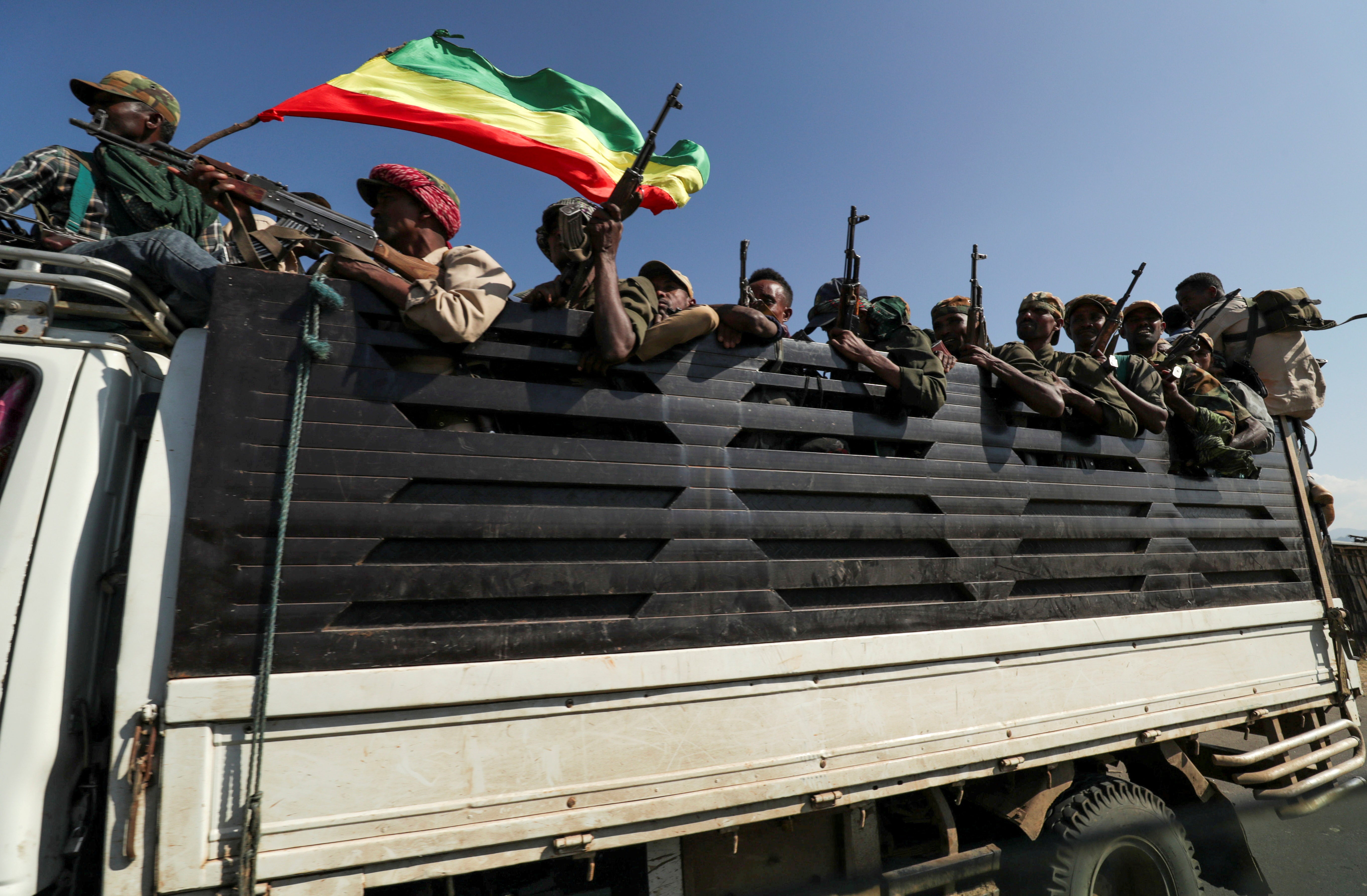War crimes feared in Ethiopia’s Tigray conflict
Amnesty International reports possibly hundred of civilians killed

Your support helps us to tell the story
From reproductive rights to climate change to Big Tech, The Independent is on the ground when the story is developing. Whether it's investigating the financials of Elon Musk's pro-Trump PAC or producing our latest documentary, 'The A Word', which shines a light on the American women fighting for reproductive rights, we know how important it is to parse out the facts from the messaging.
At such a critical moment in US history, we need reporters on the ground. Your donation allows us to keep sending journalists to speak to both sides of the story.
The Independent is trusted by Americans across the entire political spectrum. And unlike many other quality news outlets, we choose not to lock Americans out of our reporting and analysis with paywalls. We believe quality journalism should be available to everyone, paid for by those who can afford it.
Your support makes all the difference.Fighting between Ethiopian government forces and rebellious northern leaders could spiral out of control, the United Nations warned on Friday as it said war crimes may have been committed during the 10-day conflict in Tigray region.
Hundreds have been killed in the conflict and refugees have fled in droves to neighbouring Sudan, amid fears that Eritrea may be drawn in.
“There is a risk this situation will spiral totally out of control,” warned UN rights chief Michelle Bachelet, saying a massacre of civilians reported by Amnesty International would amount to war crimes if confirmed.
Prime minister Abiy Ahmed, who won a Nobel Peace Prize for a 2018 peace pact with Eritrea, may suffer damage to his reputation.
Mr Abiy accuses the Tigray People's Liberation Front (TPLF), which rules the mountainous region of more than five million people, of treason and terrorism.
Federal troops say the TPLF rose against them last week but that they have since survived a siege and recaptured the west of the region. With communications cut and media barred, there has been no independent confirmation of the state of the fighting.
The TPLF says the Abiy government has persecuted Tigrayans and purged them from official positions since he took office in April 2018, following a TPLF-led government. It terms the offensive an “invasion”.
Federal troops have been carrying out air strikes and there has been fighting on the ground since Wednesday of last week.
Refugees described bombing by government jets, shooting on the streets, killings with machetes and civilian deaths.
“The bombing has demolished buildings and killed people, and I escaped, part running on foot and part in a car,” said Hayali Kassi, a driver from Tigray who reached the Sudanese border town of Al-Fashqa, now hosting more than 7,000 refugees.
Mr Abiy, who comes from Ethiopia's largest ethnic group the Oromo, said parliament named former Addis Ababa university academic and deputy minister for science and higher education Mulu Nega as the new leader of Tigray.
There was no immediate response to Mulu's appointment from current Tigray leader Debretsion Gebremichael, who won a local election in September despite central government orders to cancel it. A dissertation by Mulu, on the website of Twente University in the Netherlands where he obtained a doctorate, states his birthplace as Tigray.
News also came on Friday that the African Union (AU) had dismissed its security head, an Ethiopian national, after the Abiy government accused him of disloyalty.
The bloc's chair Moussa Faki Mahamat ordered the removal of Gebreegziabher Mebratu Melese in a Nov. 11 memo seen by Reuters after Ethiopia's defence ministry wrote with concerns.
Horn of Africa expert Rashid Abdi said Mr Gebreegziabher was Tigrayan and his departure from the AU post was part of the Abiy government's efforts to sideline prominent Tigrayans. “It also plays into the notion that this is essentially an ethnic war masked as a centre-periphery power struggle,” he said.
However, Mr Abiy this week urged Ethiopians to ensure Tigrayans are not targeted.
His opening of political space since taking office in 2018 uncorked ethnic frictions in Africa's second most populous nation of 115 million people.
Amnesty International said scores and possibly hundreds of civilians were stabbed and hacked to death in the region on 9 November, citing witnesses who blamed the TPLF. Mr Debretsion denied that to Reuters.
More than 14,500 Ethiopian refugees - half of them children - have gone to Sudan since fighting started and aid agencies say the situation in Tigray is becoming dire. There are also concerns about a mass displacement of thousands of Eritrean refugees at a camp in Ethiopia.
Ethiopia's national army is one of Africa's largest. But its best fighters are from Tigray and much of its hardware is also there, under the Northern Command.
Nearly 4,400 Ethiopian troops serve in the AU's Somalia peacekeeping force but the Tigray conflict has raised fears that the country will not be able to maintain its commitment to opposing al-Qaeda forces in the region.
Redwan Hussein, spokesperson for a new State of Emergency Task Force for Tigray, told Reuters the offensive would not lead Ethiopia to withdraw peacekeepers abroad. “No, we are even sending troops to Darfur” in Sudan, he said.
Additional reporting by Reuters



Join our commenting forum
Join thought-provoking conversations, follow other Independent readers and see their replies
Comments